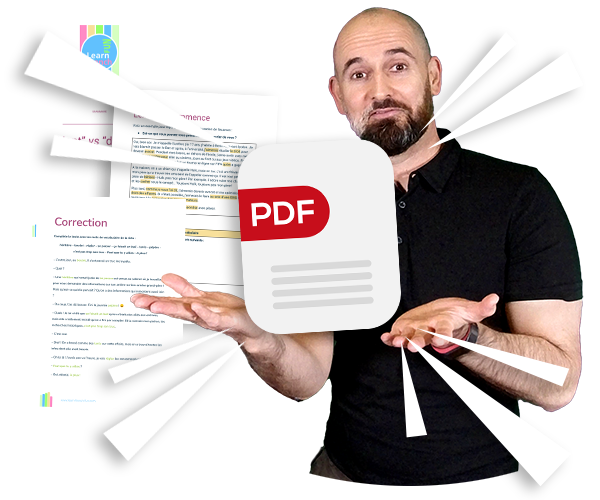Today we’re going to see WHEN and HOW to use the pronouns en and y in French.
- Summary table to know when to use the pronouns “en” and “y”
- How do you use the pronoun “en”?
- How do you use the pronoun y?
- Can y and en be used together?
- 1. En avoir marre (To be fed up)
- 2. S’en faire (To worry) – and the negative version: Ne pas s’en faire (Not to worry)
- 3. S’en aller (To go away)
- 4. En vouloir à quelqu’un (Being angry with someone)
- 5. S’y connaître (Know your stuff)
- 6. Y être pour quelque chose / N’y être pour rien (To have something to do with it / To have nothing to do with it)
- 7. Ça y est ! (That's it!)
- 8. S’y faire / Ne pas s’y faire (Getting used to it / Not getting used to it)
First of all, you should know that these pronouns are very, very used in everyday life, such as the subjunctive, or the expressions “c’est” and “il est” and even the relative pronouns dont and duquel.
Some examples:
- Tu veux un café ? (Do you want a coffee?)
- Non, merci, j’en ai déjà bu deux. (No, thanks, I’ve already had two.)
- Tu penses à acheter du pain tout à l’heure ? (Are you thinking of buying some bread later?)
- Ok, j’en achèterai en rentrant. (Okay, I’ll buy some on the way home.)
- or: Ok, j’y penserai. (Okay, I’ll think about it.)
I could give you 1,000 more examples of sentences from everyday life in which en and y are used.

PDF Bonus
We have prepared a free PDF to help you to understand the pronouns Y and EN. 👉 Download it for free
You will find a summary of the lesson, exercises to practice and the correction.
Summary table to know when to use the pronouns “en” and “y”
| You want to replace : | ||
| Quantity | en + repeat the quantity | |
| de… | en (for something) tonic pronoun (for somebody) | |
| Place | y | |
| à… | y (for something) indirect or tonic pronoun (for somebody) |
Let’s go over it in detail…
How do you use the pronoun “en”?
The pronoun en to replace a quantity
En it is used to replace a quantity.
It can be a person:
- Est-ce que tu as un frère ?
- Oui, j’en ai un.
(Do you have a brother? Yes, I do.)
Or it can be a thing:
- Tu as une question ?
- Oui, j’en ai une.
(Do you have a question? Yes, I do.)
- Tu as beaucoup de questions ?
- Oui, j’en ai beaucoup.
(Do you have many questions? Yes, I have many.)
You notice that you have to repeat the quantity!
The quantity can be expressed precisely: un, une, deux, quatre, cent…
Or it can be expressed imprecisely: peu, beaucoup, etc. (a little, a lot, etc.)
But you have to repeat the quantity.
But then, how do you do that when there is no quantity? That is, when the answer is negative?
- Est-ce que tu as un frère ?
- Non, je n’en ai pas.
(Do you have a brother? No, I don’t.)
→ No quantity? So we don’t say anything 😅
Be careful, because if you say: Non, je n’en ai pas un… (No, I don’t have one…) we will wait for you to specify another number! Je n’en ai pas un, …j’en ai 14 ! (I don’t have one, …I have 14!)
We are a very big family! 😂
Do you like learning French with videos?
Receive our free video newsletter every Friday in your e-mail box. You will get 3 “Tips & Tricks” on grammar, vocabulary, phonetics or French culture.
👉👉 Sign up now!
The pronoun en to replace what is after “de…”
We use en to replace the complement preceded by the preposition de.
What is important here is to remember that you use en when you want to replace something with de.
But be careful! In this case, we use en only for objects, ideas, concepts, in short, for something. But never for people!
Examples:
- Tu as besoin du téléphone ?
- Oui, j’en ai besoin.
(Do you need the phone? Yes, I do.)
You remember that du = de + le, right? 😉
But with a person, how do you do it?
- Est-ce que tu parles de Priscilla ?
- Oui, je parle d’elle.
(Are you talking about Priscilla? Yes, I’m talking about her.)
→ In the case of a person, we will use the tonic pronoun.
Of course, you remember tonic pronouns too? If you need more information, I’ll link you to my YouTube video on tonic pronouns.
How do you use the pronoun y?
The pronoun y to replace a place
Now the pronoun y. It is also used in two situations.
The first, I think you already know, is to replace a place.
Examples:
- Tu vas en Italie cet été ?
- Oui, j’y vais.
(Are you going to Italy this summer? Yes, I’m going.)
- Elle va chez le coiffeur ?
- Non, elle n’y va pas.
(Is she going to the hairdresser? No, she’s not going.)
The pronoun y to replace what is after “à…”
The second situation is to replace the complement preceded by the preposition à. Everything after à.
Examples:
- Ils pensent souvent à leurs dernières vacances ?
- Oui, ils y pensent souvent.
(Do they often think about their last vacation? Yes, they often think about it.)
- Tu t’intéresses au curling ?
- Non, je ne m’y intéresse pas.
(Are you interested in curling? No, I’m not interested.)
We agree, there too, you remember that: au = à + le, right? 😀
And then, like earlier with de, when you want to talk about a person, you’re not going to use y but the pronoun… indirect… or tonic!
Examples:
- Tu téléphones souvent à ta mère ?
- Oui, je lui téléphone souvent. (pronom indirect)
(Do you phone your mother often? Yes, I often phone her)
- Tu penses souvent à ta mère ?
- Oui, je pense souvent à elle. (pronom tonique)
(Do you often think about your mother? Yes, I often think about her.)
How to know if you are using the indirect or tonic pronoun ?????
→ Don’t worry, if you can think of something or somebody, it’s the tonic pronoun you should use.
If the action of the verb is not – logically – possible with a thing, it is the indirect pronoun.
You rarely phone something…
You should know that because of these rules and all these exceptions, you will unfortunately hear many French people using en or y with people! So, if at the beginning, you make a mistake once in a while, it won’t be dramatic.
Can y and en be used together?
Yes, of course, you can use the pronouns y and en in the same sentence. In this case, the pronoun y comes before the pronoun en.
Example:
- Elle te donne des bonbons à l’école ?
- Oui, elle m’y en donne.
(Does she give you candy at school? Yes, she gives me some.)
But, honestly, too many pronouns kills the pronoun 😁 I mean, sometimes it’s good, to be sure to be well understood, not to want to replace absolutely everything.
You know, if you make two sentences instead of one, or if you repeat a word it’s not a big deal… Especially if it improves the understanding of your interlocutor.
Now that you know how the pronouns en and y work, let’s take a look at a selection of 8 idioms used very frequently in French that use en and y.
8 popular French idioms with “en” and “y”
- J’ m’en vais ! - Ça y est, tu pars ? - Ouais, j’en ai marre de Manu. - Tu lui en veux ? Mais il n’y est pour rien. - Tu parles ! Il s’y connaît en problèmes ! - T’en fais pas, ça va s’arranger. Et au pire, tu t’y feras…
Did you understand that typical French dialogue? You know, this kind of little dialogue filled with short sentences that seem simple…
Yes, because students usually tell me that it sounds simple BUT they don’t understand anything!
Why do these types of sentences sound complicated?
Because they are full of little words, all those little words that we can’t distinguish anymore… And don’t forget the particular phonetics of the French…
In this little dialogue, there are 8 very common idioms that use the pronouns en and y.
And as you know, an idiom can’t be translated word by word.
So, don’t try to figure out the meaning of the sentence by trying to understand each word.
You just need to know the idiom, and the sentence will become – all of a sudden – crystal clear, obvious!

PDF Bonus
We have prepared a free PDF to help you with the 8 French idioms with Y and EN. 👉 Download it for free
You will find a summary of the lesson, exercises to practice and the correction.
1. En avoir marre (To be fed up)
En avoir marre or en avoir assez de quelqu’un ou quelque chose (“To be fed up”).
This expression means that we can’t stand sb. or sth. anymore, we don’t want to see him, hear him, or do anything with this person or this thing.
Examples:
- J’en ai assez de cette chaleur. (I’m tired of this heat.)
- Elle en a assez de ses voisins. Ils font du bruit tous les soirs. (She’s tired of her neighbors. They make noise every night.)
2. S’en faire (To worry) – and the negative version: Ne pas s’en faire (Not to worry)
To worry, to be concerned, to be afraid about something or someone.
You know, when you regularly think about something that sticks in your head, that comes back and leaves an unpleasant feeling accompanied by a little bit of fear.
Examples:
- Arrête de t’en faire, ça va bien se passer ! (Stop worrying, it will be fine!)
- Ne t’en fais pas, on ne sera pas en retard. (Don’t worry, we won’t be late.)
3. S’en aller (To go away)
To leave.
Easy to understand this expression, right?
And you can be pretty sure that a French person, in an everyday sentence, will say s’en aller much more frequently than partir.
Examples:
- Ciao, je m’en vais. (Ciao, I’m going away.)
- Non, s’il te plaît, reste encore un peu, ne t’en vas pas déjà. (No, please, stay a little longer, don’t go yet.)
4. En vouloir à quelqu’un (Being angry with someone)
Imagine this situation: You are at school and your French teacher gave you a bad mark.
But you had learned your lesson, you knew it very well and you think that this bad mark is unfair.
How do you feel?
- Tu en veux à ton professeur ! (You are angry with your teacher!)
Another example:
- Il ne faut pas leur en vouloir, ils sont jeunes. (Don’t blame them, they are young.)
5. S’y connaître (Know your stuff)
This is when you have a great skill in a specific area. You are very good at it.
In the little introductory dialogue, it was of course ironic…
- Tu parles ! Il s’y connaît en problèmes ! (You bet! He knows about problems!)
Another more classic example:
- Elle s’y connaît en informatique. (She knows about computers.) She is very good at computers.
6. Y être pour quelque chose / N’y être pour rien (To have something to do with it / To have nothing to do with it)
To be responsible for something or partly responsible. Because of somebody or something, something happened.
Examples:
- C’est pas moi, j’y suis pour rien ! (It’s not me, I’m not to blame!)
- Bien sûr que tu y es pour quelque chose, je t’ai vu faire tomber le vase par terre. (Of course you had something to do with it, I saw you drop the vase on the floor.)
7. Ça y est ! (That’s it!)
An expression used to indicate that you’ve just finished what you were doing. We have just finished the last step.
Examples:
- Ça y est, c’est prêt ! (That’s it, it’s ready!)
- Ça y est, ils recommencent à mettre la musique super fort ! (That’s it, they’re playing the music loud again!)
In this second example, “that’s it” will rather mark the starting point. But we can always explain it by saying that until this moment, everything was calm, and then, that’s it, it’s over, it’s not calm anymore.
8. S’y faire / Ne pas s’y faire (Getting used to it / Not getting used to it)
Getting used to something or somebody and eventually accepting the new situation.
Examples:
- À Nice, pendant l’été, il fait très chaud et certaines personnes n’arrivent pas à s’y faire. (In Nice, during the summer, it is very hot and some people can’t get used to it.)
- Il faut s’y faire, le temps passe vite. (You have to get used to it, time flies)
And yes, time flies… and we had time to see 8 very common idiomatic expressions used with en and y.
And that’s about it for the French pronouns en and y! Just remember the summary table, and you should be good to go. Of course, practice makes perfect, so don’t be afraid to use these two little guys in your next conversation with a Francophone – they might just throw you a few curve balls, but that’s all part of the fun!
Au revoir for now my dear students – see you soon!
Articles that might interest you:
- The Imperative in French: How to Conjugate Verbs in Imperative? When do You Have to Use the Imperative?
- The 10 Irregular Verbs in the French Subjunctive Mood
- Depuis, pendant, en, il y a, dans
- All the secrets of the French gerund!
- French verb moods
- How to use the tonic pronouns in French?
- How to use “en” and “y” pronoun in French?
- Difference between DONT and DUQUEL in French
- 10 common French verbs conjugated in the present tense. Beware of traps!
- The Direct Object Complement in French (C.O.D.) and direct complement pronouns (le, la, les…)





4 thoughts on “How to use “en” and “y” pronoun in French?”
Comments are closed.